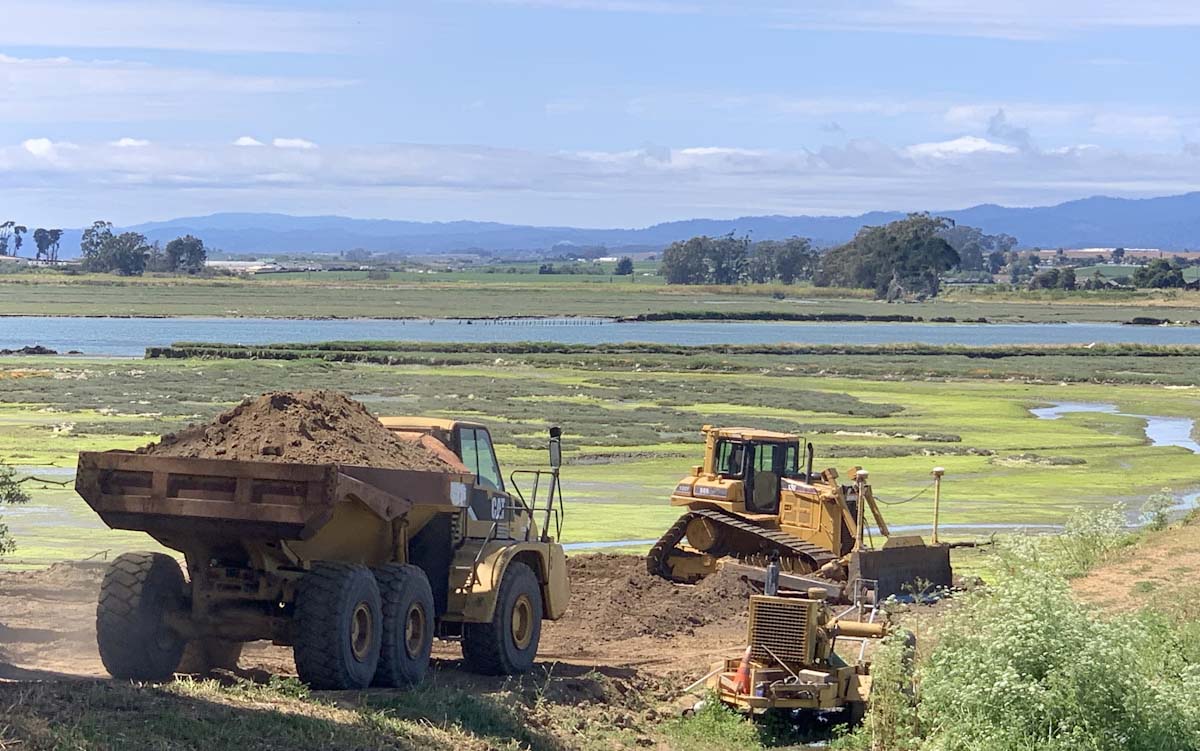Ducks Unlimited projects underway at popular Elkhorn Slough in California
DU and its partners continue to restore degraded tidal salt marshes threatened by rising seas at Elkhorn Slough in Monterey Bay.
DU and its partners continue to restore degraded tidal salt marshes threatened by rising seas at Elkhorn Slough in Monterey Bay.

The latest phase of a decades-long effort to help restore California’s largest tract of tidal salt marsh south of San Francisco Bay is underway this summer, thanks to the efforts of Ducks Unlimited and its partners at Elkhorn Slough.
For years, Ducks Unlimited has partnered with the California Department of Fish and Wildlife and the Elkhorn Slough Foundation on the Elkhorn Slough National Estuarine Research Reserve to restore degraded salt marsh and surrounding habitats.
Meandering seven miles inland from the coast, the Elkhorn Slough sits at the center of California’s iconic Monterey Bay. Last century, the mouth of the sinuous waterway was relocated to create a harbor which resulted in stronger tides washing in and out of the slough. Instead of shallow salt marshes, the slough began to function as a bay.
The slough faced another challenge. Over the decades, the water flowing into to the area from the Salinas River was diverted to supply agriculture elsewhere in the watershed.
As the freshwater inflows declined and the tidal energy increased, there weren’t enough natural sediments washing into the slough to keep wetlands above the waterline and sustain the marsh. Additionally, the conversion of wetlands for other uses along the slough resulted in subsidence and loss of wetlands. What wetlands remained were badly eroded and degraded.
Around two decades ago, Ducks Unlimited partnered with the Department of Fish and Wildlife to enhance shorebird and waterfowl habitat in portions of the 872-acre Moss Landing Wildlife Area, on the northside of the slough.
More recently, Ducks Unlimited partnered with the Elkhorn Slough National Estuarine Research Reserve on a series of projects to address wetland loss due to erosion and land subsidence -- efforts intended to improve habitat quality and sustainability as sea levels rise.
The latest project underway is the Seal Bend Tidal Marsh Enhancement Project. This summer, heavy equipment operators are raising the elevation of the Seal Bend marshes by a couple of feet. They do this by borrowing dirt from the surrounding fallow farmland that the Department of Fish and Wildlife acquired in 2009. Because of excessive groundwater withdrawal, the local aquifer suffered from seawater intrusion, making the farm impossible to irrigate.
With farming no longer viable on the property, the dirt became available for marsh restoration. Crews are now spreading that material on top of the degraded marshlands to bring them back to an elevation high enough to ensure the habitat will be sustainable as sea levels rise. Work is also underway to restore adjacent seasonal wetlands and grasslands in the area.
“We would not be able to do these restoration projects on the scale we are working on without the knowledge and expertise of the Ducks Unlimited team,” said Monique Fountain, director of the Tidal Wetland Program at the Elkhorn Slough National Estuarine Research Reserve.
The Elkhorn Slough is important to a rich diversity of wildlife, including resident and migratory birds and waterfowl, marine mammals and various species of fish. The slough’s proximity to coastal population centers makes it especially popular with birders and other wildlife watchers. Kayakers enjoy seeing the large numbers of sea lions, seals and sea otters that visit or live in the slough.
While not allowed at the Elkhorn Slough Research Reserve, waterfowl hunting and fishing is permitted in certain parts of the Elkhorn Slough.
Steve Carroll, a Ducks Unlimited engineer overseeing Ducks Unlimited’s efforts at Elkhorn Slough, said the various projects have been some of the most rewarding of his long career.
“It has a huge amount of biodiversity. It's a very productive system for fish, for marine mammals, for waterfowl and for other birds,” Carroll said. “It is a precious location. It's a very amazing spot.”
The Elkhorn Slough reserve is one of 30 National Estuarine Research Reserves that serve as field laboratories and outdoor classrooms. The reserve is administered by the National Oceanic and Atmospheric Administration and managed by the Department of Fish and Wildlife in partnership with the Elkhorn Slough Foundation. For more information about the Elkhorn Slough, visit http://www.elkhornslough.org.
Ducks Unlimited Inc. is the world's largest nonprofit organization dedicated to conserving North America's continually disappearing wetlands. Established in 1937, Ducks Unlimited has conserved 16 million acres thanks to contributions from more than a million supporters across the continent. For more information, visit www.ducks.org, and be sure to Follow DU's Twitter feed – @DucksUnlimited and @DUConserve – to get the most up-to-date news from Ducks Unlimited.
Media Contact:
Ryan Sabalow, Western Region - Communications Coordinator
(916) 805-1210
rsabalow@ducks.org
Ducks Unlimited uses cookies to enhance your browsing experience, optimize site functionality, analyze traffic, and deliver personalized advertising through third parties. By continuing to use this site, you agree to our use of cookies. View Privacy Policy